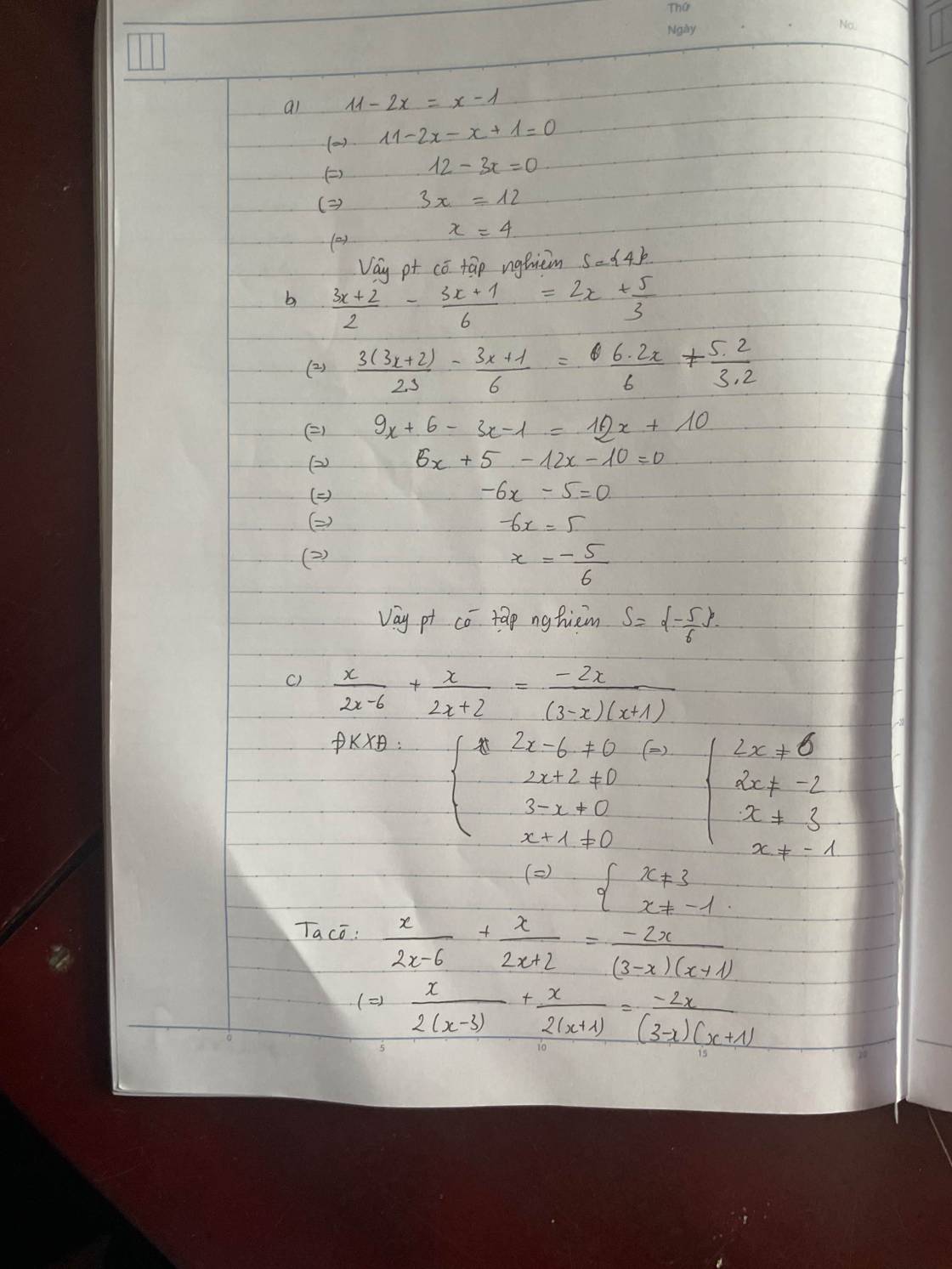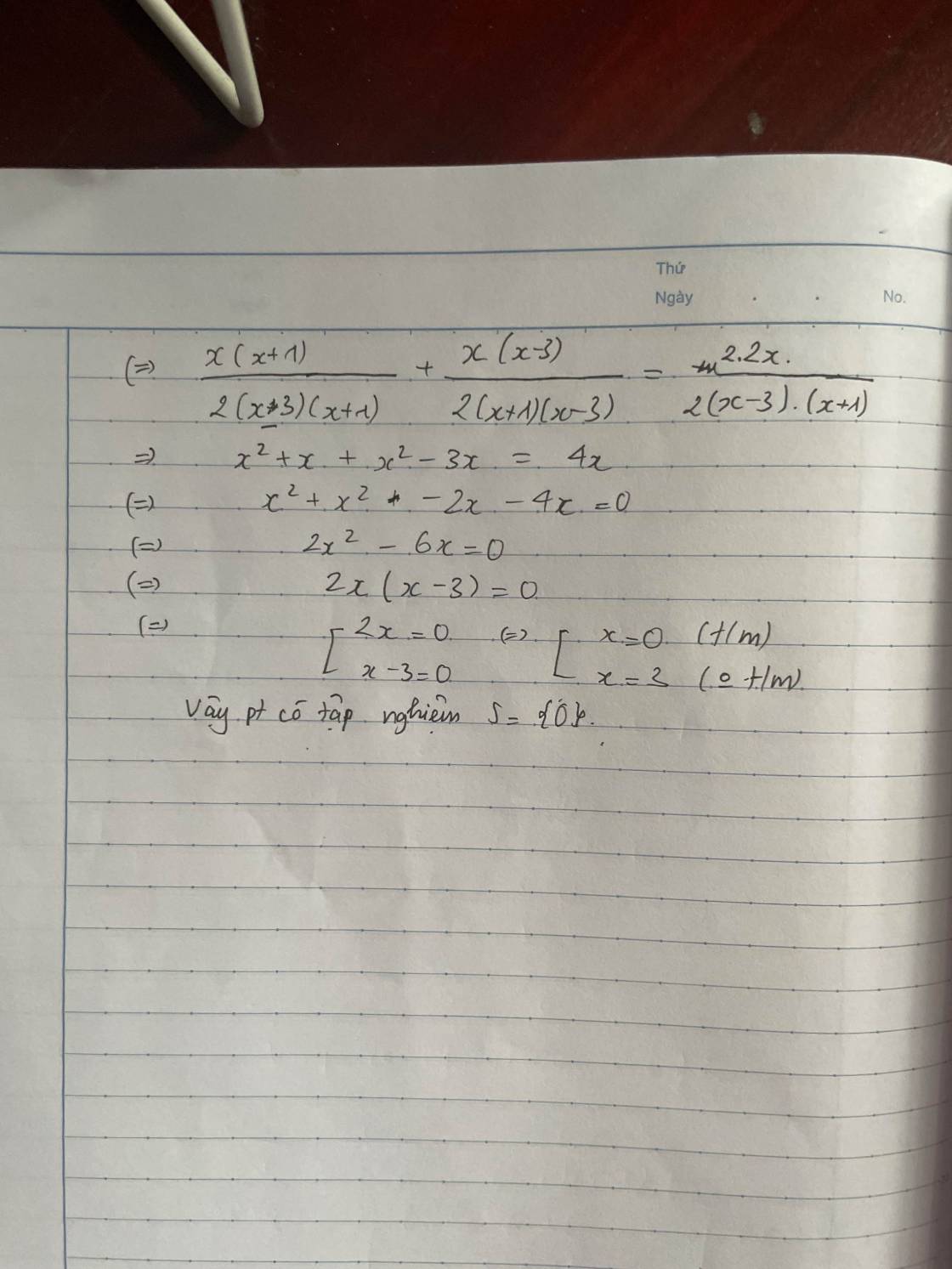Hãy nhập câu hỏi của bạn vào đây, nếu là tài khoản VIP, bạn sẽ được ưu tiên trả lời.

a: =>1+3x-6=-x+3
=>3x-5=-x+3
=>4x=8
=>x=2(loại)
b: \(\Leftrightarrow\dfrac{3\left(x-3\right)+2\left(x-2\right)}{\left(x-1\right)\left(x-2\right)\left(x-3\right)}=\dfrac{x-1}{\left(x-1\right)\left(x-2\right)\left(x-3\right)}\)
=>3x-9+2x-4=x-1
=>5x-13=x-1
=>4x=12
=>x=3(loại)
c: =>x^2-2x+4+x^3+8=12
=>x^3+x^2-2x=0
=>x(x^2+x-2)=0
=>x(x+2)(x-1)=0
=>x=0 hoặc x=1

`a,x(x+3)-(2x-1).(x+30)=0`
`<=>x^2+3x-(2x^2+59x-30)=0`
`<=>x^2+56x-30=0`
`<=>x^2+56x+28^2=28^2+30`
`<=>(x+28)^2=28^2+30`
`<=>x=+-sqrt{28^2+30}-28`
`b,x(x-3)-5(x-3)=0`
`<=>(x-3)(x-5)=0`
`<=>` $\left[ \begin{array}{l}x=3\\x=5\end{array} \right.$
`c)1/(x-1)+5/(x-2)=(3x)/((x-1)(x-2))`
`đk:x ne 1,2`
`pt<=>x-2+5(x-1)=3x`
`<=>x-2+5x-5=3x`
`<=>6x-7=3x`
`<=>3x=7`
`<=>x=7/3`
`d)(x-1)/(x+1)+(x+1)/(x-1)=(4-2x^2)/(x^2-1)`
`đk:x ne +-1`
`pt<=>(x-1)^2+(x+1)^2=4-2x^2`
`<=>2x^2+2=4-2x^2`
`<=>4x^2=2`
`<=>x^2=1/2`
`<=>x=+-sqrt{1/2}`

a) Ta có: \(\dfrac{x+4}{5}-x+4=\dfrac{x}{3}-\dfrac{x-2}{2}\)
\(\Leftrightarrow\dfrac{6\left(x+4\right)}{30}-\dfrac{30x}{30}+\dfrac{120}{30}=\dfrac{10x}{30}-\dfrac{15\left(x-2\right)}{30}\)
\(\Leftrightarrow6x+24-30x+120=10x-15x+30\)
\(\Leftrightarrow-24x+144=-5x+30\)
\(\Leftrightarrow-24x+5x=30-144\)
\(\Leftrightarrow-19x=-114\)
hay x=6
Vậy: S={6}
b) Ta có: \(\dfrac{4-5x}{6}=\dfrac{2\left(-x+1\right)}{2}\)
\(\Leftrightarrow2\cdot\left(4-5x\right)=12\left(-x+1\right)\)
\(\Leftrightarrow2-10x=-12x+12\)
\(\Leftrightarrow2-10x+12x-12=0\)
\(\Leftrightarrow2x-10=0\)
\(\Leftrightarrow2x=10\)
hay x=5
Vậy: S={5}
c) Ta có: \(\dfrac{-\left(x-3\right)}{2}-2=\dfrac{5\left(x+2\right)}{4}\)
\(\Leftrightarrow\dfrac{2\left(3-x\right)}{4}-\dfrac{8}{4}=\dfrac{5\left(x+2\right)}{4}\)
\(\Leftrightarrow6-2x-8=5x+10\)
\(\Leftrightarrow-2x+2-5x-10=0\)
\(\Leftrightarrow-7x-8=0\)
\(\Leftrightarrow-7x=8\)
hay \(x=-\dfrac{8}{7}\)
Vậy: \(S=\left\{-\dfrac{8}{7}\right\}\)
d) Ta có: \(\dfrac{7-3x}{2}-\dfrac{5+x}{5}=1\)
\(\Leftrightarrow\dfrac{5\left(7-3x\right)}{10}-\dfrac{2\left(x+5\right)}{10}=\dfrac{10}{10}\)
\(\Leftrightarrow35-15x-2x-10-10=0\)
\(\Leftrightarrow-17x+15=0\)
\(\Leftrightarrow-17x=-15\)
hay \(x=\dfrac{15}{17}\)
Vậy: \(S=\left\{\dfrac{15}{17}\right\}\)
a) Ta có: x+45−x+4=x3−x−22x+45−x+4=x3−x−22
⇔6(x+4)30−30x30+12030=10x30−15(x−2)30⇔6(x+4)30−30x30+12030=10x30−15(x−2)30
⇔6x+24−30x+120=10x−15x+30⇔6x+24−30x+120=10x−15x+30
⇔−24x+144=−5x+30⇔−24x+144=−5x+30
⇔−24x+5x=30−144⇔−24x+5x=30−144
⇔−19x=−114⇔−19x=−114
hay x=6
Vậy: S={6}
b) Ta có: 4−5x6=2(−x+1)24−5x6=2(−x+1)2
⇔2⋅(4−5x)=12(−x+1)⇔2⋅(4−5x)=12(−x+1)
⇔2−10x=−12x+12⇔2−10x=−12x+12
⇔2−10x+12x−12=0⇔2−10x+12x−12=0
⇔2x−10=0⇔2x−10=0
⇔2x=10⇔2x=10
hay x=5
Vậy: S={5}
c) Ta có: −(x−3)2−2=5(x+2)4−(x−3)2−2=5(x+2)4
⇔2(3−x)4−84=5(x+2)4⇔2(3−x)4−84=5(x+2)4
⇔6−2x−8=5x+10⇔6−2x−8=5x+10
⇔−2x+2−5x−10=0⇔−2x+2−5x−10=0
⇔−7x−8=0⇔−7x−8=0
⇔−7x=8⇔−7x=8
hay x=−87x=−87
Vậy: S={−87}S={−87}
d) Ta có: 7−3x2−5+x5=17−3x2−5+x5=1
⇔5(7−3x)10−2(x+5)10=1010⇔5(7−3x)10−2(x+5)10=1010
⇔35−15x−2x−10−10=0⇔35−15x−2x−10−10=0
⇔−17x+15=0⇔−17x+15=0
⇔−17x=−15⇔−17x=−15
hay x=1517x=1517
Vậy: S={1517}
a) Ta có: x+45−x+4=x3−x−22x+45−x+4=x3−x−22
⇔6(x+4)30−30x30+12030=10x30−15(x−2)30⇔6(x+4)30−30x30+12030=10x30−15(x−2)30
⇔6x+24−30x+120=10x−15x+30⇔6x+24−30x+120=10x−15x+30
⇔−24x+144=−5x+30⇔−24x+144=−5x+30
⇔−24x+5x=30−144⇔−24x+5x=30−144
⇔−19x=−114⇔−19x=−114
hay x=6
Vậy: S={6}
b) Ta có: 4−5x6=2(−x+1)24−5x6=2(−x+1)2
⇔2⋅(4−5x)=12(−x+1)⇔2⋅(4−5x)=12(−x+1)
⇔2−10x=−12x+12⇔2−10x=−12x+12
⇔2−10x+12x−12=0⇔2−10x+12x−12=0
⇔2x−10=0⇔2x−10=0
⇔2x=10⇔2x=10
hay x=5
Vậy: S={5}
c) Ta có: −(x−3)2−2=5(x+2)4−(x−3)2−2=5(x+2)4
⇔2(3−x)4−84=5(x+2)4⇔2(3−x)4−84=5(x+2)4
⇔6−2x−8=5x+10⇔6−2x−8=5x+10
⇔−2x+2−5x−10=0⇔−2x+2−5x−10=0
⇔−7x−8=0⇔−7x−8=0
⇔−7x=8⇔−7x=8
hay x=−87x=−87
Vậy: S={−87}S={−87}
d) Ta có: 7−3x2−5+x5=17−3x2−5+x5=1
⇔5(7−3x)10−2(x+5)10=1010⇔5(7−3x)10−2(x+5)10=1010
⇔35−15x−2x−10−10=0⇔35−15x−2x−10−10=0
⇔−17x+15=0⇔−17x+15=0
⇔−17x=−15⇔−17x=−15
hay x=1517x=1517
Vậy: S={1517}

a: =>-3x=-12
=>x=4
b: =>3(3x+2)-3x-1=12x+10
=>9x+6-3x-1=12x+10
=>12x+10=6x+5
=>6x=-5
=>x=-5/6
c: =>x(x+1)+x(x-3)=4x
=>x^2+x+x^2-3x-4x=0
=>2x^2-6x=0
=>2x(x-3)=0
=>x=3(loại) hoặc x=0(nhận)

a) \(4x-16=3x\left(x-4\right)\)
\(4\left(x-4\right)=3x\left(x-4\right)\)
\(3x\left(x-4\right)-4\left(x-4\right)=0\)
\(\left(x-4\right)\left(3x-4\right)=0\)
\(\Leftrightarrow\left[{}\begin{matrix}x=4\\x=\dfrac{4}{3}\end{matrix}\right.\)
b) \(\dfrac{x+2}{x-2}-\dfrac{1}{x}=\dfrac{2}{x\left(x-2\right)}\left(đk:x\ne0,2\right)\)
\(\dfrac{x\left(x+2\right)-\left(x-2\right)}{x\left(x-2\right)}=\dfrac{2}{x\left(x-2\right)}\)
\(x^2+2x-x+2=2\)
\(x^2+x=0\)
\(x\left(x+1\right)=0\)
\(\Leftrightarrow\left[{}\begin{matrix}x=0\\x=-1\end{matrix}\right.\)

Lời giải:
a)
PT \(\Leftrightarrow \frac{(x+2)^3}{8}-\frac{x^3+8}{2}=0\)
\(\Leftrightarrow (x+2)^3-4(x^3+8)=0\)
\(\Leftrightarrow (x+2)^3-4(x+2)(x^2-2x+4)=0\)
\(\Leftrightarrow (x+2)[(x+2)^2-4(x^2-2x+4)]=0\)
\(\Leftrightarrow (x+2)(-3x^2+12x-12)=0\)
\(\Leftrightarrow (x+2)(x^2-4x+4)=0\Leftrightarrow (x+2)(x-2)^2=0\Rightarrow x=\pm 2\)
b) Bạn kiểm tra lại xem có sai đề không?

Với \(x=0\) không phải nghiệm
Với \(x\ne0\) chia 2 vế cho \(x^2\), pt tương đương:
\(2x^2+3x-1+\dfrac{3}{x}+\dfrac{2}{x^2}=0\)
\(\Leftrightarrow2\left(x+\dfrac{1}{x}\right)^2+3\left(x+\dfrac{1}{x}\right)-5=0\)
\(\Leftrightarrow\left[{}\begin{matrix}x+\dfrac{1}{x}=1\\x+\dfrac{1}{x}=-\dfrac{5}{2}\end{matrix}\right.\)
\(\Leftrightarrow\left[{}\begin{matrix}x^2-x+1=0\\2x^2+5x+2=0\end{matrix}\right.\)
\(\Leftrightarrow\left[{}\begin{matrix}\left(x-\dfrac{1}{2}\right)^2+\dfrac{3}{4}=0\left(vô-nghiệm\right)\\\left(x+2\right)\left(2x+1\right)=0\end{matrix}\right.\)
\(\Leftrightarrow\left[{}\begin{matrix}x=-2\\x=-\dfrac{1}{2}\end{matrix}\right.\)
Câu a chắc là đề sai, vì nghiệm vô cùng xấu, tử số của phân thức cuối cùng là \(x+17\) mới hợp lý
b.
Đặt \(x+3=t\)
\(\Rightarrow\left(t+1\right)^4+\left(t-1\right)^4=14\)
\(\Leftrightarrow t^4+6t^2-6=0\) (đến đây đoán rằng bạn tiếp tục ghi sai đề, nhưng thôi cứ giải tiếp)
\(\Rightarrow\left[{}\begin{matrix}t^2=-3+\sqrt{15}\\t^2=-3-\sqrt{15}\left(loại\right)\end{matrix}\right.\)
\(\Rightarrow t=\pm\sqrt{-3+\sqrt{15}}\Rightarrow x=-3\pm\sqrt{-3+\sqrt{15}}\)
Câu c chắc cũng sai đề, vì lên lớp 8 rồi không ai cho đề kiểu này cả, người ta sẽ rút gọn luôn số 1 bên trái và 60 bên phải.

1a.
ĐKXĐ: \(x\ne\left\{1;3\right\}\)
\(\Leftrightarrow\dfrac{6}{x-1}=\dfrac{4}{x-3}+\dfrac{4}{x-3}\)
\(\Leftrightarrow\dfrac{3}{x-1}=\dfrac{4}{x-3}\Leftrightarrow3\left(x-3\right)=4\left(x-1\right)\)
\(\Leftrightarrow3x-9=4x-4\Rightarrow x=-5\)
b.
ĐKXĐ: \(x\ne\left\{-1;2\right\}\)
\(\Leftrightarrow\dfrac{5}{x+1}=\dfrac{3}{2-x}+\dfrac{1}{2-x}\)
\(\Leftrightarrow\dfrac{5}{x+1}=\dfrac{4}{2-x}\Leftrightarrow5\left(2-x\right)=4\left(x+1\right)\)
\(\Leftrightarrow10-2x=4x+4\Leftrightarrow6x=6\Rightarrow x=1\)
1c.
ĐKXĐ: \(x\ne\left\{2;5\right\}\)
\(\Leftrightarrow\dfrac{3x\left(x-5\right)}{\left(x-2\right)\left(x-5\right)}-\dfrac{x\left(x-2\right)}{\left(x-2\right)\left(x-5\right)}=\dfrac{-3x}{\left(x-2\right)\left(x-5\right)}\)
\(\Leftrightarrow3x\left(x-5\right)-x\left(x-2\right)=-3x\)
\(\Leftrightarrow2x^2-10x=0\Leftrightarrow2x\left(x-5\right)=0\Rightarrow\left[{}\begin{matrix}x=0\\x=5\left(loại\right)\end{matrix}\right.\)
2a.
\(\Leftrightarrow-4x^2-5x+6=x^2+4x+4\)
\(\Leftrightarrow5x^2+9x-2=0\Rightarrow\left[{}\begin{matrix}x=-2\\x=\dfrac{1}{5}\end{matrix}\right.\)
2b.
\(2x^2-6x+1=0\Rightarrow x=\dfrac{3\pm\sqrt{7}}{2}\)



a) \(\left(x+1+\dfrac{1}{x}\right)^2=\left(x-1-\dfrac{1}{x}\right)^2\\ \Leftrightarrow\left(x+1+\dfrac{1}{x}\right)^2-\left(x-1-\dfrac{1}{x}\right)^2=0\\ \Leftrightarrow\left(x+1+\dfrac{1}{x}-x+1+\dfrac{1}{x}\right)\left(x+1+\dfrac{1}{x}+x-1-\dfrac{1}{x}\right)=0\\ \Leftrightarrow2\left(1+\dfrac{1}{x}\right)\cdot2x=0\\ \Leftrightarrow4x\left(1+\dfrac{1}{x}\right)=0\\ \Leftrightarrow\left[{}\begin{matrix}x=0\\x=-1\end{matrix}\right.\)
\(S=\left\{-1;0\right\}\) là tập nghiệm của pt.
b) Ta có: \(\left(x-1\right)^2+3x^2=0\)
\(\Leftrightarrow x^2-2x+1+3x^2=0\)
\(\Leftrightarrow4x^2-2x+1=0\)
\(\text{Δ}=\left(-2\right)^2-4\cdot4\cdot1=4-16=-12< 0\)
=> Phương trình vô nghiệm
Vậy: \(S=\varnothing\)